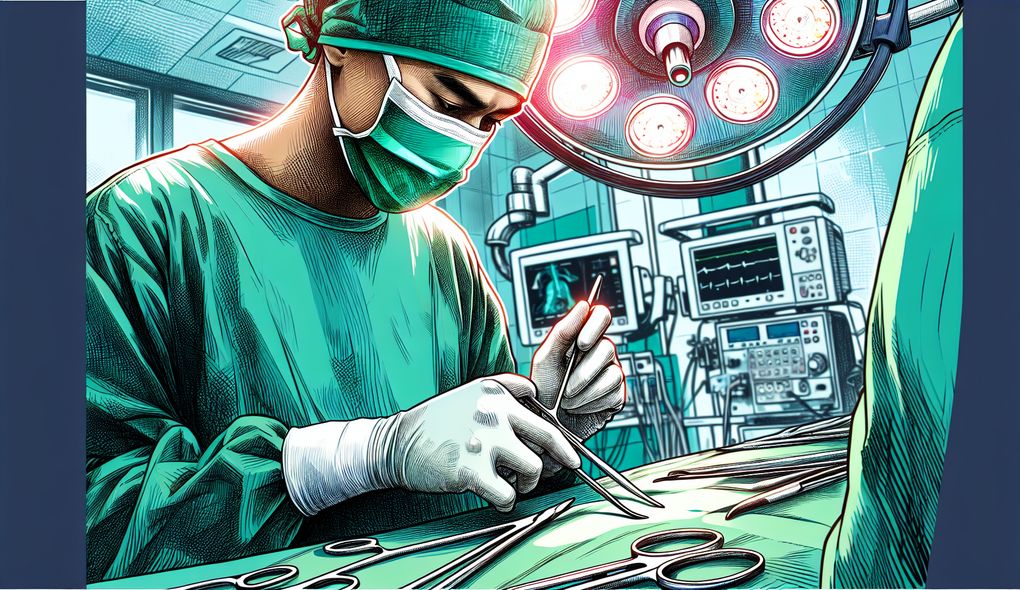Tell me about a time when you made a mistake or encountered a problem during a surgical procedure and how you resolved it.
INTERMEDIATE LEVEL

Sample answer to the question:
During a surgical procedure, I once made a mistake by passing the wrong instrument to the surgeon. It was a high-pressure situation, and I quickly realized my error. I immediately informed the surgeon and apologized for the mistake. To resolve the problem, I quickly retrieved the correct instrument and handed it to the surgeon. The surgery continued smoothly without any further issues, and the patient's safety was never compromised. After the procedure, I took the time to reflect on the mistake and understand what went wrong. I realized that I was rushing and not paying enough attention to detail. Since then, I have made it a priority to slow down and double-check everything I do to avoid similar mistakes in the future.
Here is a more solid answer:
During a complex surgical procedure, I encountered a problem when one of the surgical instruments malfunctioned. The surgeon immediately needed a replacement instrument to continue the surgery smoothly. In a high-pressure situation, I quickly assessed the situation and communicated the problem to the circulating nurse. While the nurse retrieved a backup instrument from the sterile supply, I ensured the sterile field was maintained by covering it with sterile drapes. Once the replacement instrument was available, I handed it to the surgeon, allowing the procedure to proceed without any significant disruption. After the surgery, I participated in the investigation of the malfunctioning instrument and identified the issue - a loose connection. I reported this to the sterilization department, and they promptly resolved the problem. This experience taught me the importance of staying calm under pressure, effectively communicating with the surgical team, and actively participating in problem-solving to ensure patient safety.
Why is this a more solid answer?
The solid answer provides a more comprehensive description of a problem encountered during a surgical procedure. It demonstrates the ability to assess and communicate the problem effectively, maintain the sterile field, and actively participate in problem-solving. The answer also highlights the importance of staying calm under pressure and the commitment to patient safety. However, it can be further improved by providing specific examples of critical-thinking and following complex instructions and procedures.
An example of a exceptional answer:
During a critical surgical procedure, I encountered a complex problem when a patient experienced a sudden unexpected bleeding. The surgeon and the team immediately needed to identify the source and stop the bleeding to prevent further complications. With a high level of critical-thinking, I quickly assessed the situation and identified a possible vessel laceration that required immediate repair. I informed the surgeon and asked for permission to assist in the repair. The surgeon agreed, and I efficiently gathered the necessary instruments, ensured their sterility, and handed them to the surgeon. At the same time, I collaborated with the circulating nurse to control the bleeding and maintain a clear surgical field. Through effective communication and teamwork, we successfully stopped the bleeding and continued with the surgery. Afterward, I actively participated in the analysis of the incident, highlighting the need for enhanced communication and coordination of actions during emergency situations. This experience reinforced the importance of critical-thinking, effective communication, and the ability to follow complex instructions and procedures, even in high-stress situations.
Why is this an exceptional answer?
The exceptional answer provides a detailed and comprehensive description of a complex problem encountered during a surgical procedure. It demonstrates exceptional critical-thinking skills, effective communication, and the ability to collaborate in a high-pressure situation to ensure patient safety. The answer also highlights the commitment to ongoing improvement through the analysis of incidents. It effectively addresses all the evaluation areas and aligns with the requirements of the Surgical Technician role.
How to prepare for this question:
- Review your past experiences in the operating room and identify any incidents or mistakes that occurred during surgical procedures.
- Reflect on how you resolved those incidents and the lessons you learned from them.
- Familiarize yourself with the key skills required for a Surgical Technician, such as attention to detail, critical-thinking, and problem-solving.
- Practice storytelling to effectively communicate your experiences during the interview.
- Emphasize the importance of patient safety and your commitment to following complex instructions and procedures.
What are interviewers evaluating with this question?
- Attention to detail
- Critical-thinking
- Problem-solving
- Following complex instructions and procedures

